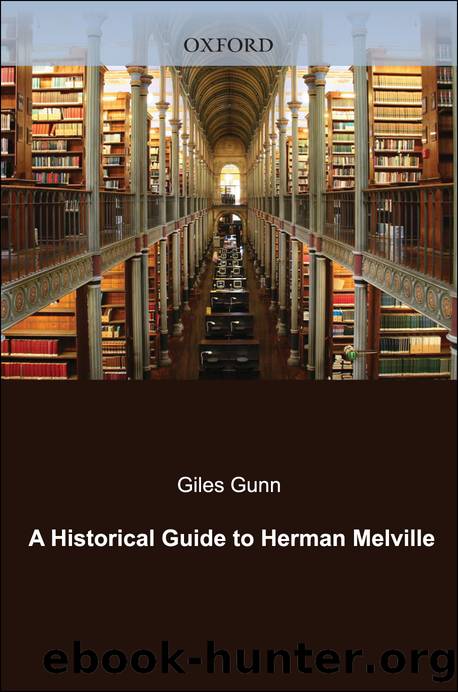A Historical Guide to Herman Melville by Gunn Giles;

Author:Gunn, Giles;
Language: eng
Format: epub
Publisher: Oxford University Press USA - OSO
Published: 2005-08-15T00:00:00+00:00
NOTES
1. Melville, Review of Nathaniel Hawthorne’s Mosses from an Old Manse, Literary World, 17 August 1850, 126.
2. For a detailed study of the relation between marketplace conditions and the works of Herman Melville, see Sheila Post, Correspondent Colorings: Melville in the Marketplace (Amherst: University of Massachusetts Press, 1996). I am indebted to the University of Massachusetts Press for granting me permission to rely on material from my book for this chapter.
3. Quoted in Kathleen Tillotson, Novels of the 1840s (Oxford: Clarendon Press, 1954), 16.
4. Evert Duyckinck, Literary World, 22 November 1851; Review of Melville’s Moby-Dick, John Bull, 25 October 1851.
5. Margaret Fuller, Review of Melville’s Typee, New York Tribune, 4 April 1846.
6. Charles Briggs, Review of Melville’s Typee, Anti-Slavery Standard, 27 May 1847; Columbian Magazine, June 1847.
7. New York Mirror, 13 April 1849.
8. Harrison Hayford, “Historical Note I,” Moby-Dick; or, The Whale, 1851; rpt, (Evanston and Chicago: Norwestern University Press and The Newberry Library, 1968), 583; James McIntosh, “The Mariner’s Multiple Quest,” in New Essays on Moby-Dick, ed. Richard Brodhead (Cambridge: Cambridge University Press, 1986), 26; George R. Stewart, “The Two Moby-Dicks,” American Literature (1954): 414–48; Larzer Ziff, “Shakespeare in Melville’s America,” in New Perspectives on Melville, ed. Faith Pullen (Edinborgh: Edinburgh University Press, 1978), 55.
9. Edward Bulwer-Lytton, “On the Different Kinds of Prose Fiction with Some Apology for the Fiction of the Author,” in The Disowned (London: Bently, 1835), 1: i-ix; quoted in Edwin M. Eigner, The Metaphysical Novel in England and America (Berkeley: The University of California Press, 1978), 1–12.
10. David Masson, “British Novelists since Scott, Lecture IV,” in Masson, British Novelists and Their Styles: Being a Critical Sketch of the History of British Prose (Cambridge: Macmillan, 1859), 214–27; partially reprinted in Edwin Eigner and George J. Worth, eds., Victorian Criticism of the Novel (New York: Cambridge University Press, 1985), 148–58; Masson, “British Novelists,” 275–76.
11. Masson, “British Novelists,” 287–88.
12. Richard Burleigh Kimball, St. Leger; or, The Threads of Life (London: Richard Bentley, 1850), 232.
13. “Review of Mayo’s The Berber,” Harper’s Magazine, (December 1850).
14. Sylvester Judd, Margaret: A Tale of the Real and Ideal, Blight and Bloom (Boston: Jordan and Wiley, 1845), 240.
15. New Haven Daily Palladium, 17 November 1851.
16. William Kirkand, “British and American Monthlies,” Godey’s Lady’s Book, June 1845, 271.
17. Washington Irving, “Editor’s Column,” Knickerbocker, March 1839.
18. Robert Bonner, “Editor’s Column,” New York Ledger, 19 May 1855.
19. Fred Louis Pattee, The Feminine Fifties (New York: Macmillian, 1940), 196; quoted in Susan Coultrap-McQuinn, Doing Literary Business: American Women Writers in the Nineteenth Century (Chapel Hill: University of North Carolina Press, 1990), 75.
20. American Publisher’s Circular and Literary Gazette, 31 May, 1856.
21. Quoted in M. Thomas Inge, Bartleby the Inscrutable, (Ham-den, Conn.: Archon Books, 1979), 31.
22. Parke Godwin, George William Curtis: A Commerative Address Delivered before the Century Association, New York, December 17, 1892 (New York: Harpers and Bros., 1892), 29–30.
23. “Review of The Homes of American Authors,” Putman’s, January, 1853.
Download
This site does not store any files on its server. We only index and link to content provided by other sites. Please contact the content providers to delete copyright contents if any and email us, we'll remove relevant links or contents immediately.
Love Your Life by Sophie Kinsella(1157)
Albion by Peter Ackroyd(995)
The Hell of it All by Charlie Brooker(868)
How To Be A Woman by Caitlin Moran(799)
Albion: The Origins of the English Imagination by Peter Ackroyd(792)
A Dictionary of Literary Symbols by Michael Ferber(749)
All in a Don's Day by Mary Beard(736)
The Eye in the Triangle: An Interpretation of Aleister Crowley by Israel Regardie(714)
Protector by Conn Iggulden(714)
English Literature: A Very Short Introduction by Jonathan Bate(684)
Dot Con by James Veitch(662)
Less: Winner of the Pulitzer Prize for Fiction 2018 by Andrew Sean Greer(614)
English Literature: A Very Short Introduction (Very Short Introductions) by Bate Jonathan(566)
I, Partridge by Alan Partridge(543)
The Cambridge Introduction to Jane Austen (Cambridge Introductions to Literature) by Janet Todd(507)
Mussolini: His Part in My Downfall by Spike Milligan(505)
Work! Consume! Die! by Boyle Frankie(502)
Katharine Parr, the Sixth Wife by Alison Weir(499)
I can make you hate by Charlie Brooker(485)
